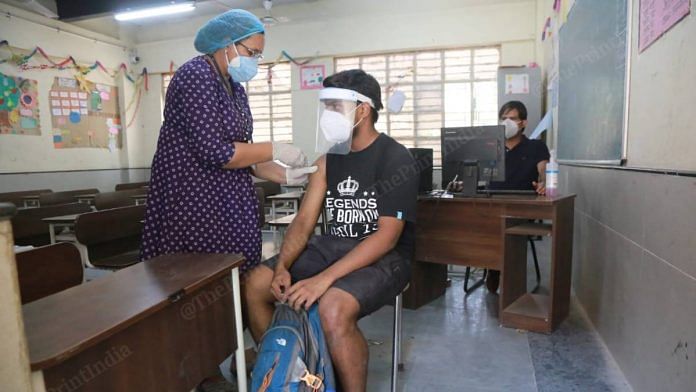New Delhi: Vaccination can reduce the risk of hospitalisation due to Covid by nearly 70 per cent and decrease the risk of severe disease by a third, notes a UK study published in the The Lancet Infectious Diseases journal.
Released Thursday, the large-scale study — led by King’s College London, and involving researchers from University College London, Massachusetts General Hospital, and Harvard Medical school — looked at breakthrough Covid infections in the UK. The study used data from a smartphone-based Covid symptom tracking app, collected from 8 December 2020 to 4 July 2021.
Among other things, the researchers found that the odds of experiencing long Covid — illness lasting 28 days or more after a positive test — were cut in half for people who received two vaccine doses.
Breakthrough Covid infections are those that occur among people who are partially or fully vaccinated.
According to the study, people most vulnerable to a breakthrough infection after their first vaccine dose included adults over the age of 60 years, especially those living with underlying conditions such as obesity, heart disease, kidney disease and lung disease.
The study also suggests that people in densely populated urban settings were more likely to experience a breakthrough infection.
“Breakthrough infections are expected and don’t diminish the fact that these vaccines are doing exactly what they were designed to do — save lives and prevent serious illness,” Claire Steves of King’s College London, one of the authors of the study, said in a statement.
“Other research has shown a mortality rate as high as 27 per cent for hospitalised Covid-19 patients. We can greatly reduce that number by keeping people out of the hospital in the first place through vaccination,” Steves added.
Also read: What newly-discovered C.1.2 lineage of SARS-CoV-2 is & why it’s not yet a ‘variant of concern’
‘0.2% fully vaccinated individuals infected by Covid’
Out of more than 12,40,009 adults who received at least one dose of either the BNT162b2 (Pfizer-BioNTech), ChAdOx1 nCoV-19 (Oxford-AstraZeneca), or mRNA-1273 (Moderna) vaccine, 6,030 — or fewer than 0.5 per cent — reported a breakthrough infection more than 14 days after their first dose, the researchers said.
Meanwhile, among 9,71,504 adults who received two vaccine doses, 2,370 — fewer than 0.2 per cent — experienced a breakthrough infection more than seven days after their second dose.
The odds of a breakthrough infection being asymptomatic increased by 63 per cent after one vaccine dose and by 94 per cent after the second dose, according to the study.
The risk of hospitalisation also reduced by approximately 70 per cent after one or two doses.
The risk of severe disease, which is defined as having five or more symptoms in the first week of illness, also reduced by a third. Additionally, the odds of long Covid were reduced by 50 per cent after two doses.
For those who did experience symptoms after either one or two vaccine doses, such as fatigue, cough, fever and loss of taste and smell, almost all symptoms were reported less frequently than in unvaccinated people.
In frail older adults over the age of 60 years, the risk of a breakthrough infection after one vaccine dose was almost two times that for healthy older adults.
The researchers also noted that risk of a breakthrough infection was linked to the place a person lived.
People living in areas with deprivation such as having closer living quarters and lower overall vaccination rates had the highest risk of a breakthrough infection following their first vaccine dose.
The researchers state that these results are not unexpected and reflect what has been observed throughout the pandemic.
“These groups are at a greater risk of exposure and are therefore more vulnerable to infection. Health policies designed to prevent infections, including policies around timing between the first and second dose and potential booster shots, should prioritise these groups,” said Rose Penfold of King’s College, London, one of the authors of the study.
(Edited by Rachel John)
Also read: Ensure all teachers are vaccinated with at least one dose by Sept, Modi govt tells states, UTs



